Let’s be real – DNA is a thing. Every human, animal, and plant has it. To some, it may be a complex, mysterious thing, but most folks at least understand that DNA, or your genetic code, is the blueprint for what you are and what you can do. Every minute there are thousands of people and billions of dollars dedicated to decoding the human genome and understanding what it means for each human. “Big deal,” thinks the horse person, “who cares…what about my horse?!” Let’s face it, if you are reading this, you could probably take or leave most humans, it is your horse that matters. So then how does your horse’s genetic story play into his or her life? How does it affect yours? Read on, dear horse person, and let’s explore.
What might you do differently if you knew your horse was genetically programmed to be a sprinter versus having more long-distance or endurance ability? Maybe you would choose to compete in a well-suited discipline enabling them to excel. What if you knew they were predisposed to developing severe kissing spines? You would likely be more proactive in your management and training, such as incorporating back strengthening exercises and precise saddle fitting, to minimize the risk.
Your horse has a unique genetic makeup – and it’s full of valuable information! This priceless knowledge can empower you in so many ways, from being able to make the best decisions regarding health and performance, to better understanding their temperament and suitability to a particular discipline, climate, or feed. Knowing your horse down to the DNA provides invaluable insights for their long-term happiness and success, which we all understand, equates to your own.
From just 30-40 pulled mane or tail hairs, equestrians of all backgrounds can learn so much about their horse’s inherited genetic code. Everything from ancestry and inbreeding value, to “% Thoroughbred blood,” temperament, health risks, and performance traits; the list goes on and on.
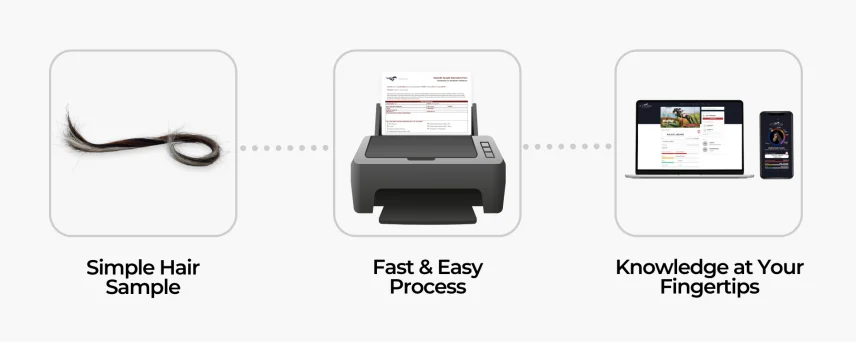
Understanding and Achieving Their Genetic Potential
You have likely heard of the various commercially available DNA tests for dogs that tell you their breed makeup. You know, the one your “dog-mom” friend posted all over social media about how her mutt, Fluffy, is 25% this, 20% that, and 100% adorable? Etalon offers a similar, yet more applicable and actionable ancestry and composition technology for horses!
Etalon’s Ancestry, Composition, and Breed Analysis is an in-depth comparison of your horse’s genetic makeup and how it is like, or unlike, other horses within various “breeds,” disciplines, and populations around the world. Relatives, like your horse’s parents, siblings, aunts, uncles, and close cousins will also be identified and will appear in their online family tree with the Find My Herd & Horses Like Me Upgrade. The journey begins by using a “reference” population; meaning a population of horses that have previously been analyzed and compared to one another for genetic similarity and difference.
You supply your horse’s DNA from a pulled hair sample – way easier than swabbing their cheek! Etalon then compares your horse’s genetic makeup (the “mystery” horse) to an established reference horse set (“known” horses) and provides information on what your horse has in common with each reference horse and their group as a whole.
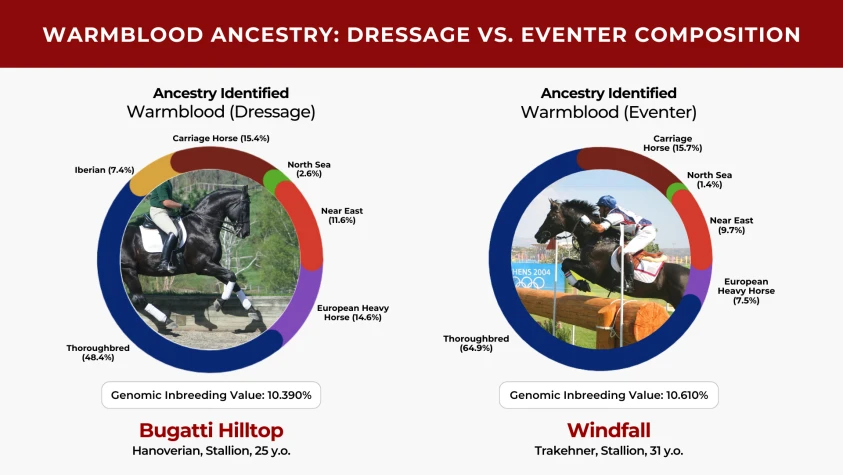
Sure, the chart is fun and the information is excellent, but how could this testing actually help you in a practical way? Take a look at the two horses above and their genetic composition: Can you see a difference between the Dressage horse versus the Eventing horse?
Scenario 1: The Ultimate Pre-purchase
ADVERTISEMENT
Say you’re off to Europe to purchase your dream Warmblood to further your Eventing career. After sorting through your favorite bloodlines, you have narrowed it down to two farms with spectacular sires and dams known for throwing lovely, talented Eventing horses. You have chosen five foals from the lineup and are sweating over your decision. Since you have already cleared a bill of health for each foal (no genetic diseases like PSSM1 or Fragile Foal Syndrome, clean x-rays, fitting disposition, etc.), your decision should be easier, but it is not that simple, and you know there is much more to the equation. Basic health genetics aside, Etalon panels will also provide you with key information on speed, gait, temperament, “% Thoroughbred” and genomic inbreeding – all of which, when combined, can directly affect your success in the arena and suitability for the chosen discipline.
Scenario 2: Evaluating Your Next Prospect
The ongoing problem with traditional horse shopping? Selecting merely by bloodline can be a gamble. A specific sire and dam combination known to produce Show Jumpers can also produce the occasional Dressage star. It often takes years of growing, training, trial and error before an individual prospect can be assessed, and let’s face it, time is money. Time not spent in the saddle or even in the wrong saddle is time wasted. So how do you tip the hand in your favor? Composition! By understanding what a successful Eventing horse looks like genetically, you now have a better reference point. In comparing the DNA profile of your Warmblood Mystery Athlete to the known genetic profiles of the top Eventing and Dressage horses, you can begin to see which horse may better suit your needs.
Compare the genetic composition of the two horses below: One is an Eventer and the other a Dressage Champion – how are they different? Alike?
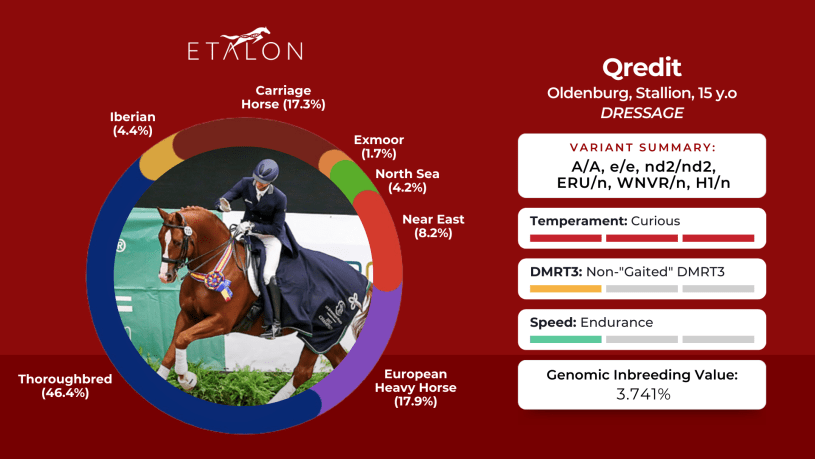
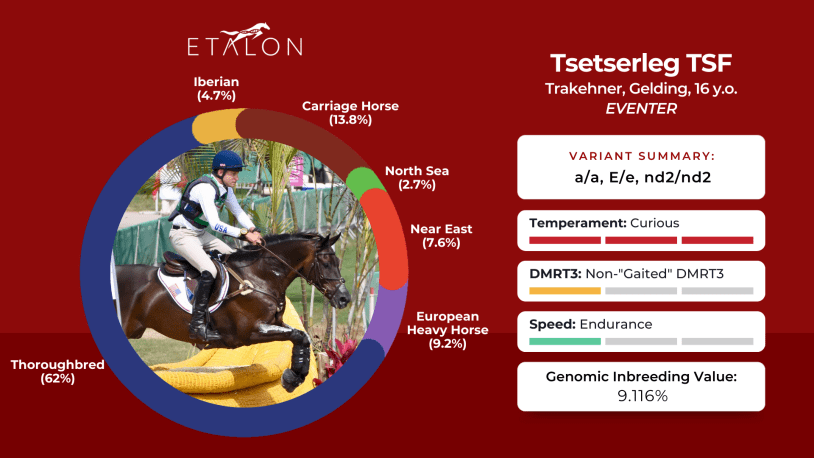
This method is historically referred to as “% Thoroughbred Blood” and has been, thus far, calculated based on pedigree…a reasonable method, but far less accurate than genetic calculations based on the actual genes inherited and visualized.
Another valuable area where ancestry testing comes into play is with inbreeding. It’s widely understood that inbreeding (the practice of breeding from closely related animals, especially over many generations) is not ideal, but it was somewhat unavoidable back when there were considerably fewer horses to breed. Now, however, we can be much more selective in our breeding practices to maximize genetic diversity and performance. One recent study of Thoroughbreds found that a 10% increase in inbreeding is associated with a 7% lower probability of ever racing.1 Put simply, this means that as inbreeding goes up, performance goes down.
Our ancestry testing provides you with a “Genomic Inbreeding Value.” That is a measure of your horse’s inbreeding derived from their actual genetic diversity as opposed to the more commonly used inbreeding coefficient which is a calculated estimate based on a horse’s reported pedigree. Two full siblings from the same parents will show the same inbreeding coefficient using the traditional pedigree estimate when, in reality, they can be very different. It would be like saying you are exactly like your sibling, which you obviously aren’t because we don’t inherit the exact same genes from each parent, and neither do horses. It’s best to base this figure on actual genes inherited! We can even take this one step further by looking at your horse’s unique inbreeding value compared to a potential mate’s inbreeding value to determine a predicted inbreeding value for future foals.
Scenario 3: Breeding and Inbreeding
You could have two broodmares that are full sisters, therefore they share identical pedigrees, but differ in their genomic inbreeding value – crazy, right? Armed with that information, you may choose to breed the mare with a lower inbreeding value over the mare with a higher inbreeding value to optimize your future foal’s genetic makeup for greater diversity. But that doesn’t mean you can’t also breed your mare who has the higher inbreeding coefficient! You can use the predicted inbreeding value to choose the right stud that will increase that future foal’s genetic diversity and optimize that cross. The possibilities are endless!
ADVERTISEMENT
Evaluating Health Risks
If you have ever wished your horse could tell you whether or not they might be predisposed to certain health conditions, genetic testing is for you! Etalon testing options include over 100 genetic tests for common health and disease risks like Polysaccharide Storage Myopathy Type 1 (PSSM1), Fragile Foal Syndrome (FFS), Equine Recurrent Uveitis Risk (ERU Risk), Kissing Spines Susceptibility (KSS), Chronic Idiopathic Anhidrosis Risk (CIA Risk), even Equine Herpesvirus (EHV) Susceptibility and more, plus temperament and performance traits!
This invaluable knowledge of a horse’s DNA empowers horse owners, breeders, and trainers to make the best management and training decisions for each individual horse. For example, if your horse tests positive for one or two copies of the Kissing Spines Susceptibility genetic variant, you know that your horse carries a higher risk of developing a higher grade of Kissing Spines.2 They are not automatically destined to develop the condition as there are many factors at play, but if they are genetically predisposed to the disease, you can take precautionary action to train them with that in mind, work with your vet on a preventative or maintenance program, or choose not to breed them in the future.
From pampered broodmares to Olympic athletes, all equestrians can benefit from knowing what health and performance issues their horses are genetically at risk for developing.
Performance and Abilities
Etalon’s comprehensive diagnostic health panels include insights into your horse’s unique genetic tendencies, whether they are a speed or endurance athlete, curious or vigilant about their surroundings, and whether or not they carry genes that correlate with a particular type of movement. Each of these performance-related areas can help you make the best career decisions for your equine athlete so that they can excel in whatever discipline aligns best with their DNA.
If you have a specific discipline in mind for your future partner, evaluating their speed-related genetics can offer a leg-up. One example of this that we have observed is in exceptional Show Jumpers who have one sprint type gene variant and one endurance type variant. These elite horses, such as Flexible and Banba who are half-siblings sired by Cruising, all fall into this category. They have the endurance to complete a course plus the speed necessary to put up consistently fast times. We also see similarities in speed-related genetics reflected in top Dressage and Eventing horses such as Tsetserleg TSF and Qredit. These top Eventers regularly carry two copies of the endurance type variant.
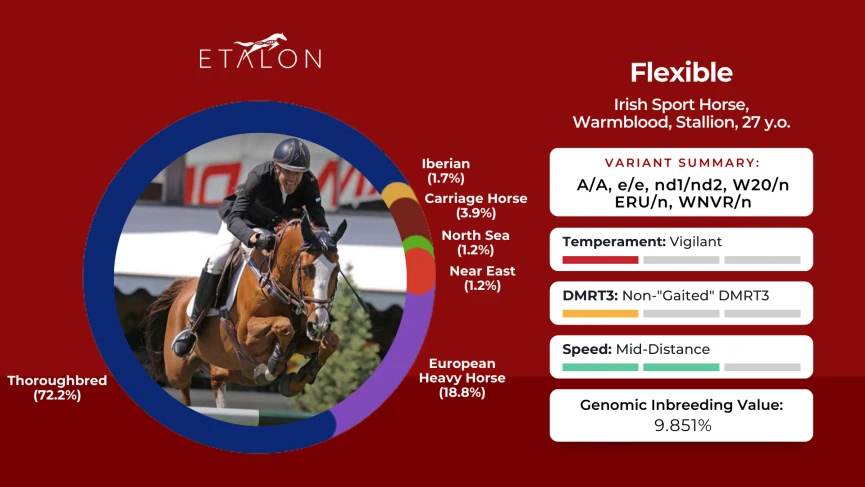
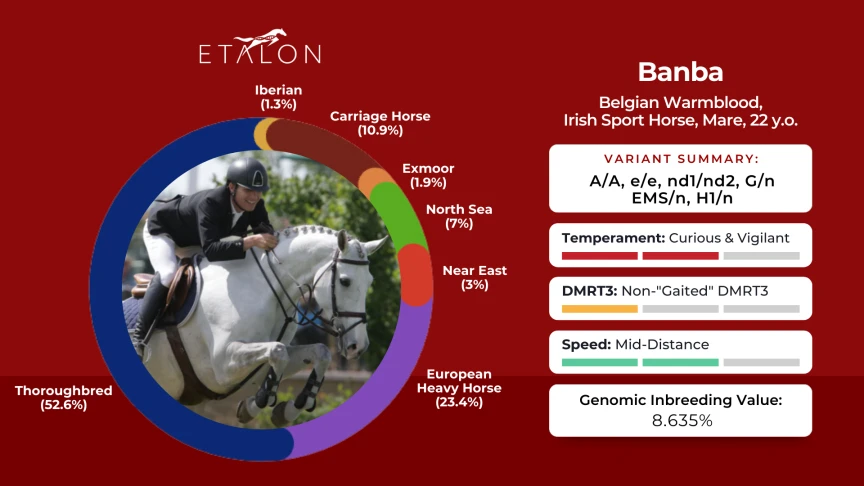
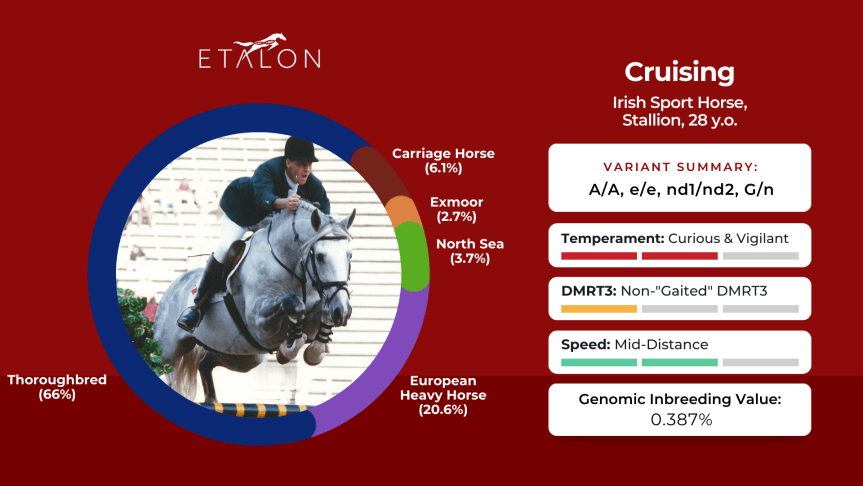
You can also evaluate your horse for its genetic tendency towards being either curious, vigilant, or a mixture of both. Curiosity refers to the horse’s interest in novel objects and a willingness to approach them, whereas vigilance refers to the horse’s tendency to examine its surroundings. In an ongoing study with Etalon clientele and top trainers, differences in training response and behavior between the two temperament genotypes can sometimes be startling. If you already know what you prefer in your athletic partner, this information can be especially helpful in determining whether a horse is a good match for you and/or your trainer. If you know that you like a more technical ride, a vigilant horse could be more suited to you. Whereas if you like a horse that’s a bit more forgiving of its rider or its surroundings, a curious horse might be a better fit.
Designing Your Dream Horse
Genetics play a huge role in the performance capability and health of your equine athlete. Whether you are looking to purchase a new horse, manage a current horse, or breed a future superstar, understanding your horse’s genetic makeup can equip you with the necessary information to make the best decisions for their future.
From ancestry and composition to health risks and performance traits, Etalon Equine Genetics empowers breeders and equestrians of all disciplines with the invaluable knowledge needed to unlock and optimize the performance potential of their equine athlete. Knowing your horse down to their DNA will help you make decisions throughout their life that are ultimately in their best interest and yours. Get to know your horse, down to their DNA today by signing up for an account at EtalonDx.com. Don’t miss our unique tech features including Build-A-Horse, Find-A-Horse, and Find My Herd…all inside our one-of-a-kind platform!
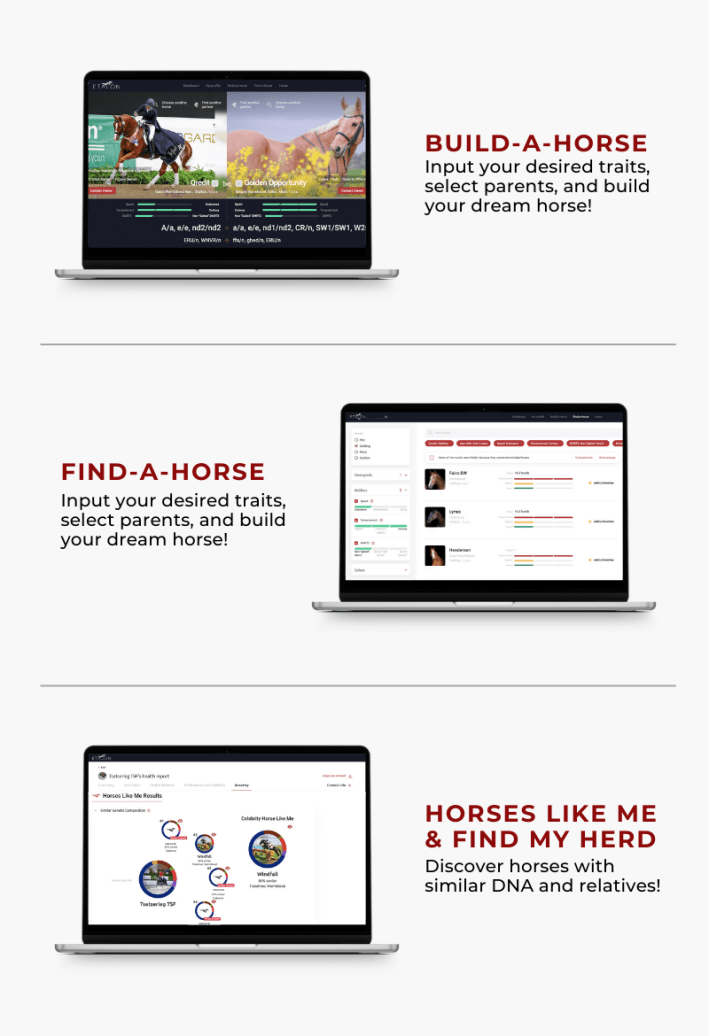
1 Hill, E. W., Stoffel, M. A., McGivney, B. A., MacHugh, D. E., & Pemberton, J. M. (2022). Inbreeding depression and the probability of racing in the Thoroughbred horse. Proceedings of the Royal Society B: Biological Sciences, 289(1977). https://doi.org/10.1098/rspb.2022.0487.
2 Patterson Rosa, L., Whitaker, B., Allen, K., Peters, D., Buchanan, B., McClure, S., Honnas, C., Buchanan, C., Martin, K., Lundquist, E., Vierra, M., Foster, G., Brooks, S. A., & Lafayette, C. (2022). Genomic loci associated with performance limiting equine overriding spinous processes (kissing spines). Research in veterinary science, 150, 65–71. https://doi.org/10.1016/j.rvsc.2022.06.015















